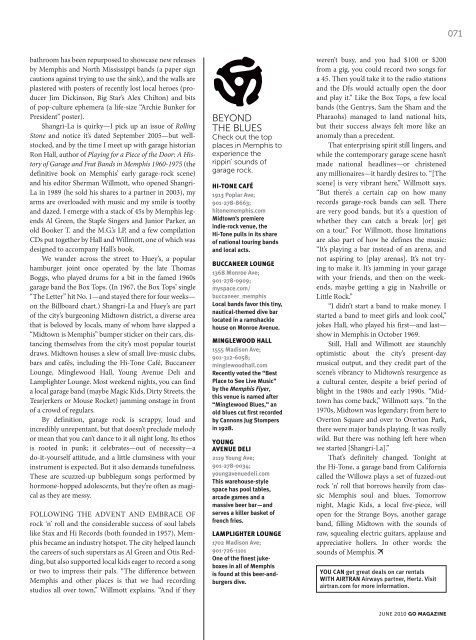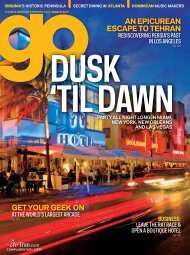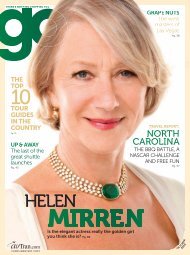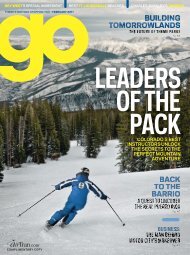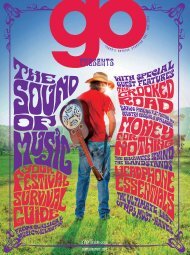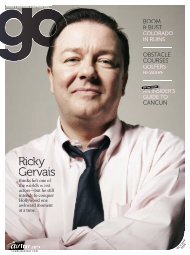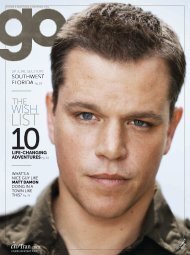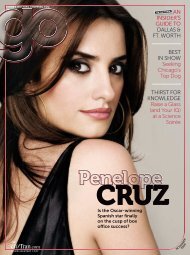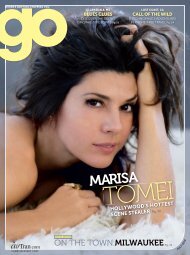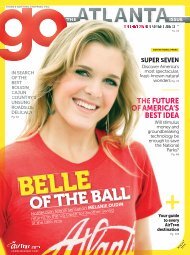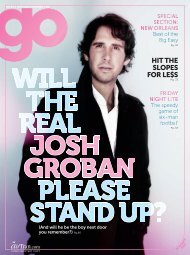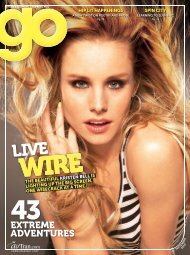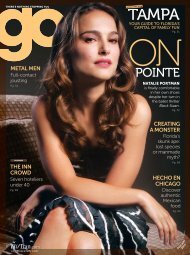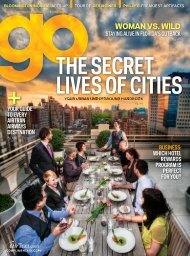june-2010
june-2010
june-2010
Create successful ePaper yourself
Turn your PDF publications into a flip-book with our unique Google optimized e-Paper software.
athroom has been repurposed to showcase new releases<br />
by Memphis and North Mississippi bands (a paper sign<br />
cautions against trying to use the sink), and the walls are<br />
plastered with posters of recently lost local heroes (producer<br />
Jim Dickinson, Big Star’s Alex Chilton) and bits<br />
of pop-culture ephemera (a life-size “Archie Bunker for<br />
President” poster).<br />
Shangri-La is quirky—I pick up an issue of Rolling<br />
Stone and notice it’s dated September 2005—but wellstocked,<br />
and by the time I meet up with garage historian<br />
Ron Hall, author of Playing for a Piece of the Door: A History<br />
of Garage and Frat Bands in Memphis 1960-1975 (the<br />
definitive book on Memphis’ early garage-rock scene)<br />
and his editor Sherman Willmott, who opened Shangri-<br />
La in 1989 (he sold his shares to a partner in 2003), my<br />
arms are overloaded with music and my smile is toothy<br />
and dazed. I emerge with a stack of 45s by Memphis legends<br />
Al Green, the Staple Singers and Junior Parker, an<br />
old Booker T. and the M.G.’s LP, and a few compilation<br />
CDs put together by Hall and Willmott, one of which was<br />
designed to accompany Hall’s book.<br />
We wander across the street to Huey’s, a popular<br />
hamburger joint once operated by the late Thomas<br />
Boggs, who played drums for a bit in the famed 1960s<br />
garage band the Box Tops. (In 1967, the Box Tops’ single<br />
“The Letter” hit No. 1—and stayed there for four weeks—<br />
on the Billboard chart.) Shangri-La and Huey’s are part<br />
of the city’s burgeoning Midtown district, a diverse area<br />
that is beloved by locals, many of whom have slapped a<br />
“Midtown is Memphis” bumper sticker on their cars, distancing<br />
themselves from the city’s most popular tourist<br />
draws. Midtown houses a slew of small live-music clubs,<br />
bars and cafés, including the Hi-Tone Café, Buccaneer<br />
Lounge, Minglewood Hall, Young Avenue Deli and<br />
Lamplighter Lounge. Most weekend nights, you can find<br />
a local garage band (maybe Magic Kids, Dirty Streets, the<br />
Tearjerkers or Mouse Rocket) jamming onstage in front<br />
of a crowd of regulars.<br />
By definition, garage rock is scrappy, loud and<br />
incredibly unrepentant, but that doesn’t preclude melody<br />
or mean that you can’t dance to it all night long. Its ethos<br />
is rooted in punk; it celebrates—out of necessity—a<br />
do-it-yourself attitude, and a little clumsiness with your<br />
instrument is expected. But it also demands tunefulness.<br />
These are scuzzed-up bubblegum songs performed by<br />
hormone-hopped adolescents, but they’re often as magical<br />
as they are messy.<br />
FOLLOWING THE ADVENT AND EMBRACE OF<br />
rock ‘n’ roll and the considerable success of soul labels<br />
like Stax and Hi Records (both founded in 1957), Memphis<br />
became an industry hotspot. The city helped launch<br />
the careers of such superstars as Al Green and Otis Redding,<br />
but also supported local kids eager to record a song<br />
or two to impress their pals. “The difference between<br />
Memphis and other places is that we had recording<br />
studios all over town,” Willmott explains. “And if they<br />
BEYOND<br />
THE BLUES<br />
Check out the top<br />
places in Memphis to<br />
experience the<br />
rippin’ sounds of<br />
garage rock.<br />
HI-TONE CAFÉ<br />
1913 Poplar Ave;<br />
901-278-8663;<br />
hitonememphis.com<br />
Midtown’s premiere<br />
indie-rock venue, the<br />
Hi-Tone pulls in its share<br />
of national touring bands<br />
and local acts.<br />
BUCCANEER LOUNGE<br />
1368 Monroe Ave;<br />
901-278-0909;<br />
myspace.com/<br />
buccaneer_memphis<br />
Local bands favor this tiny,<br />
nautical-themed dive bar<br />
located in a ramshackle<br />
house on Monroe Avenue.<br />
MINGLEWOOD HALL<br />
1555 Madison Ave;<br />
901-312-6058;<br />
minglewoodhall.com<br />
Recently voted the “Best<br />
Place to See Live Music”<br />
by the Memphis Flyer,<br />
this venue is named after<br />
“Minglewood Blues,” an<br />
old blues cut first recorded<br />
by Cannons Jug Stompers<br />
in 1928.<br />
YOUNG<br />
AVENUE DELI<br />
2119 Young Ave;<br />
901-278-0034;<br />
youngavenuedeli.com<br />
This warehouse-style<br />
space has pool tables,<br />
arcade games and a<br />
massive beer bar—and<br />
serves a killer basket of<br />
french fries.<br />
LAMPLIGHTER LOUNGE<br />
1702 Madison Ave;<br />
901-726-1101<br />
One of the finest jukeboxes<br />
in all of Memphis<br />
is found at this beer-andburgers<br />
dive.<br />
weren’t busy, and you had $100 or $200<br />
from a gig, you could record two songs for<br />
a 45. Then you’d take it to the radio stations<br />
and the DJs would actually open the door<br />
and play it.” Like the Box Tops, a few local<br />
bands (the Gentrys, Sam the Sham and the<br />
Pharaohs) managed to land national hits,<br />
but their success always felt more like an<br />
anomaly than a precedent.<br />
That enterprising spirit still lingers, and<br />
while the contemporary garage scene hasn’t<br />
made national headlines—or christened<br />
any millionaires—it hardly desires to. “[The<br />
scene] is very vibrant here,” Willmott says.<br />
“But there’s a certain cap on how many<br />
records garage-rock bands can sell. There<br />
are very good bands, but it’s a question of<br />
whether they can catch a break [or] get<br />
on a tour.” For Willmott, those limitations<br />
are also part of how he defines the music:<br />
“It’s playing a bar instead of an arena, and<br />
not aspiring to [play arenas]. It’s not trying<br />
to make it. It’s jamming in your garage<br />
with your friends, and then on the weekends,<br />
maybe getting a gig in Nashville or<br />
Little Rock.”<br />
“I didn’t start a band to make money. I<br />
started a band to meet girls and look cool,”<br />
jokes Hall, who played his first—and last—<br />
show in Memphis in October 1969.<br />
Still, Hall and Willmott are staunchly<br />
optimistic about the city’s present-day<br />
musical output, and they credit part of the<br />
scene’s vibrancy to Midtown’s resurgence as<br />
a cultural center, despite a brief period of<br />
blight in the 1980s and early 1990s. “Midtown<br />
has come back,” Willmott says. “In the<br />
1970s, Midtown was legendary; from here to<br />
Overton Square and over to Overton Park,<br />
there were major bands playing. It was really<br />
wild. But there was nothing left here when<br />
we started [Shangri-La].”<br />
That’s definitely changed. Tonight at<br />
the Hi-Tone, a garage band from California<br />
called the Willowz plays a set of fuzzed-out<br />
rock ‘n’ roll that borrows heavily from classic<br />
Memphis soul and blues. Tomorrow<br />
night, Magic Kids, a local five-piece, will<br />
open for the Strange Boys, another garage<br />
band, filling Midtown with the sounds of<br />
raw, squealing electric guitars, applause and<br />
appreciative hollers. In other words: the<br />
sounds of Memphis.<br />
YOU CAN get great deals on car rentals<br />
WITH AIRTRAN Airways partner, Hertz. Visit<br />
airtran.com for more information.<br />
JUNE <strong>2010</strong> GO MAGAZINE<br />
071


